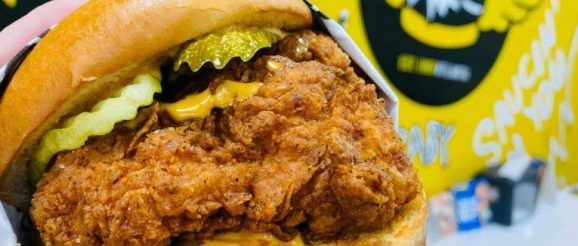WNB Factory Leverages Quality and Innovation to Accelerate Development | QSR magazine

WNB Factory’s entire brand and foundation is built upon one simple mission: “only the good stuff.”
The tagline refers to the certified angus beef, all-natural cage-free wings, high-quality natural cheese, and locally grown toppings. Beyond menu offerings, the message also represents how the 62-unit chain navigated the pandemic. “Only good stuff” seems to be happening to the brand in light of the chaotic environment.
WNB, which stands for wings and burgers, opened 18 locations in 2020, a year-over-year growth rate of roughly 40 percent. Even as the Delta variant ravages the country, same-store sales are growing double digits year-over-year and have remained steady from May through August. The Texas market saw a 55 percent increase in sales since WNB entered the area eight months ago, and systemwide, the company is reeling in $3.5 million in monthly sales.
As the brand heads toward the rest of 2021 and into 2022, it plans to parlay favorable sales into more unit development.
“We’ve got contracts right now on at least 20 stores, which is going to pretty much take us pretty close to the 100 mark,” says Robert Bales, vice president and COO of parent company PK Restaurant Group. “We also have some contracts pending for some other markets.”
A majority of WNB locations are in Georgia, in addition to a handful of outlets across Virginia, Alabama, and Dallas. Two more stores are scheduled to open in the DMV market within the next 12 weeks, including Jessup, Maryland, and Richmond, Virginia. Those restaurants, combined with other recently opened locations, are expected to contribute $7.2 million in additional sales in 2022.
WNB also signed a three-unit development deal to open units in Cincinnati, Ohio, and Bales says the brand is expecting to seal an agreement for Springfield, Massachusetts. To test the Florida market, the company is considering a partnership with a third party to open a ghost kitchen.
The COO says the concept looks to build stores in large residential and suburban areas, with marketplace incomes of $70,000 or more, such as recent additions Acworth and Marietta, Georgia.
“We’re not trying to be in the middle of like Atlanta and compete with 60 different brands within a 5-square-mile area,” Bales says. “We’re trying to be a little bit more niche in markets where we feel like there’s a better opportunity, where there’s not as much of the competitive side so we have better exposure for what we do instead of trying to compete with everybody else out there in the same space and the high-rent districts. That’s not where we want to go. We want to go into a little bit smaller markets where we feel like we have better exposure and we get better results.”
